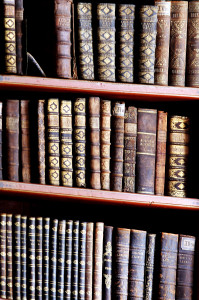Faith on the Edge of a Cliff – Thoughts of a Wyoming Catholic College Student – Episode 2
Last month, I introduced this blog series by describing my enthusiastic discovery of Great Books schools, specifically Wyoming Catholic College, which I will be attending in the fall. This month, I bring up some common doubts and challenges I’ve encountered in advocating a classical, Catholic, liberal education.
The Great Books—or a great waste of time?
Over the past year or so, I’ve had many peers, relatives and adult friends ask me what I want to study in college. When I would reply I wanted to attend a Great Books school, their faces would typically go blank. After I would try to explain, their expressions might shift to a mild concern. What was a “Great Books school,” they’d ask? Why didn’t it have any majors—only a liberal arts degree? Wasn’t I worried about not being able to choose my own courses? What did I expect to do for a career, once I finished with this…unusual method of education?
I’ve had trouble explaining my motives fully to my concerned acquaintances. For the full explanation requires a pouring out of my heart. My desire to go to a Great Books school is so wrapped up in my faith, my love of truth and beauty, and my poetic view of the world, that it isn’t reducible to a single sentence—or even a single conversation. But I do want to address these doubts and questions—not least because they have crossed my mind as well. So I will attempt to answer them here, briefly.
- What is a Great Books school?
A Great Books college is one which presents an ordered, integrated curriculum, comprised of the reflective study of the works of the best writers, artists, philosophers and scientists of Western history. The purpose of this education is not only to teach the student about his cultural heritage, but to actually engage him in the conversation of his ancestors, on the perennial human questions: Why do we exist? Is there absolute truth? What is goodness? Who is God? And so on. From poetry to politics to metaphysics, a Great Books education nourishes the imagination, steels and disciplines the mind, and morally orders the soul.
There are a few secular institutions, such as St. John’s College in Annapolis, which still follow this purpose and curriculum. In the case of Wyoming Catholic College, of course, the traditional array of great authors is taught in the context of revealed Church doctrine. The ultimate purpose of the College is to set its students on the path to Heaven. That’s quite a mission statement.
- Why does a Great Books school have no majors—only a liberal arts degree?
In higher education today, specialization is rampant. Colleges typically only prepare students for a particular task in society—doctor, lawyer, technician, scientist, etc. Even the traditional humanities have become fragmented disciplines for specialists, tending towards the analytic. (An example: once in a public high school library I saw a poster advertising the school’s digital research tools. The poster displayed a rather bewildered Shakespeare sitting in front of a computer, wondering, “What are they saying about me now?” Right—because the study of Shakespeare is no longer about what Shakespeare has to say, but what specialized literary critics have to say about him.)
The purpose of a Great Books education is general education. These are the principles, the faculties, the insights, the common experience of all humanity. For we are human beings before we are workers of any kind. Catholic liberal education through the Great Books nourishes our uniting essence as free, rational creatures of God. If that doesn’t deserve (at least!) four years of study, I don’t know what does.
- Isn’t it troubling that Great Books students cannot choose their own courses?
Flannery O’Connor, writing on how literature classes ought to be taught, once quipped, “And if the student finds that this [teaching method] is not to his taste? Well, that is regrettable…His taste should not be consulted; it is being formed.”
In this light, the typical university’s lure of “self-directed education” is revealed as ridiculous. What right have I, the as-yet-uneducated student, to determine the form and content of my own learning? Humility is required for education—a joyful openness and zeal to wrestle with ideas one never would have considered on one’s own.
There is another advantage to taking the same exact same classes and reading the exact same books as every other student in the college. Common knowledge and interest form culture; when the common interest is the joyful pursuit of wisdom through the Great Books, a community of learners is born who really care about truth, beauty, and the practice of virtuous life. It is this kind of people who quietly (and sometimes not so quietly) change the world for the better.
- How does a Great Books school prepare the student for a stable career?
The primary purpose of a Great Books school is general education, not vocational training. That said, of course we all need to make a living, and to serve our fellow men. Technical training has a place. It is a good and useful one. But unless firmly fixed in a society with a strong moral order, even useful disciplines lose their ultimate meaning, opening doors to greed, exploitation, evil and suffering. We do need skillful men and women in our society, but first we need them to be good men and women.
I maintain that a liberal education not only teaches that necessary virtue, but it also lays the foundation for any and all vocational training a student may undergo after he graduates. Any career—medicine, business, education, the fine arts—requires for success a keen, disciplined mind, clear problem solving and communication skills, and a patient and persevering spirit. These qualities a Great Books school cultivates; it develops a person’s innate human potential, before sending him or her to a particular task in society.
In conclusion, while I do not yet have an exact career plan after college, in all honesty, I’m not worried. I was more worried about studying for an unsatisfying career and being miserable in it. I simply wanted to learn—to know things—to humanly flourish. I will be doing that at Wyoming Catholic College.



